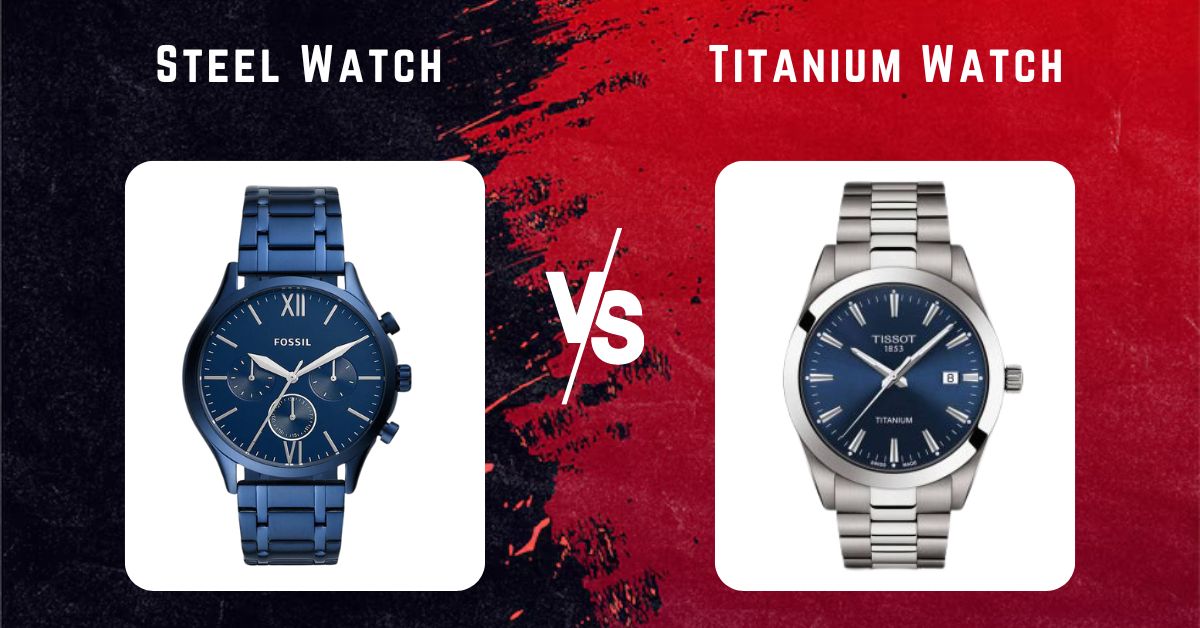The world of watches boasts a vast array of materials, each with its unique advantages and disadvantages. Two popular choices for watch cases are titanium and stainless steel. This comprehensive guide delves into the key characteristics of both materials, helping you make an informed decision when selecting your next timepiece.
Unveiling the Titans: Exploring Titanium Watches
Titanium is a lustrous, silver-white metal renowned for its exceptional strength-to-weight ratio. It’s incredibly light, yet remarkably strong and resistant to corrosion. These qualities make it a compelling choice for various applications, including aerospace, medical implants, and, of course, watchmaking.
Benefits of Titanium Watches
Lightweight: Significantly lighter than stainless steel, offering superior comfort for everyday wear, especially on smaller wrists.
Hypoallergenic: Titanium is a biocompatible metal, making it ideal for those with nickel allergies that can cause skin irritation with stainless steel.
Durability: Highly resistant to scratches, dents, and corrosion, ensuring the watch maintains its pristine look for years to come.
Aesthetics: Titanium possesses a unique, slightly darker, and warmer hue compared to stainless steel, offering a distinctive and modern aesthetic.
Considerations for Titanium Watches
Price: Generally more expensive than stainless steel watches, particularly for complex or high-end models.
Scratches: While scratch-resistant, titanium scratches can be more noticeable due to the different way they show wear compared to stainless steel. Micro-abrasions may blend in more readily with stainless steel, whereas titanium scratches can appear whiter and more prominent.
Limited Design Options: The selection of titanium watches might be smaller compared to stainless steel, particularly for more affordable models.
The Enduring Appeal: Understanding Stainless Steel Watches
Stainless steel has been a mainstay in watchmaking for decades. It’s a robust and versatile material known for its excellent combination of affordability, durability, and style.
Benefits of Stainless Steel Watches
Affordability: Stainless steel offers a wider range of price points, making it accessible to a broader audience.
Durability: Highly resistant to corrosion, scratches, and dents, ensuring the watch can withstand daily wear and tear.
Versatility: Stainless steel comes in various finishes – polished, brushed, or PVD-coated – offering a vast array of aesthetic options to suit different styles.
Wider Selection: Stainless steel is the dominant material in watchmaking, providing a more extensive selection of styles, brands, and price points.
Considerations for Stainless Steel Watches
Weight: Stainless steel is heavier than titanium, which might be a factor for those who prefer a lightweight watch for everyday wear.
Allergic Reactions: Nickel, a common component in stainless steel, can cause skin irritation for some individuals with nickel allergies.
Scratches: While scratch-resistant, stainless steel scratches can become noticeable over time, especially with polished finishes.
| Feature | Titanium | Stainless Steel |
|---|---|---|
| Material | Strong, lightweight metal | Alloy of steel, chromium, and nickel |
| Weight | Significantly lighter | Heavier |
| Hypoallergenic | Yes | May cause irritation for those with nickel allergies |
| Durability | Scratch-resistant, corrosion-resistant | Scratch-resistant, corrosion-resistant |
| Aesthetics | Unique, slightly darker hue | Versatile; various finishes available |
| Price | Generally more expensive | Wider range of price points |
| Design Options | Limited options, especially for affordable models | Wider selection of styles and brands |
Brands, Models, and Series Utilizing Steel and Titanium
This section provides a glimpse into various watch brands and their popular models that utilize either stainless steel or titanium for their cases.
Stainless Steel
Rolex: Renowned for their luxury sports watches like the Submariner (OysterSteel), Daytona (OysterSteel), and Explorer (OysterSteel).
Omega: Offers a wide range of stainless steel models, including the Speedmaster Moonwatch (Professional), Seamaster Diver 300M (Co-Axial Master Chronometer), and Railmaster (Master Chronometer).
Grand Seiko: Known for their high-end dress watches and sports watches in stainless steel, like the Grand Seiko Spring Drive (9R65) and the Grand Seiko Hi-Beat (9S85).
Seiko: Offers a vast selection of stainless steel models, from affordable divers like the Seiko Prospex (automatic) to dress watches like the Seiko Presage (automatic).
Citizen: A reliable brand with a wide range of stainless steel watches, including the Citizen Eco-Drive (solar) and the Promaster (automatic).
Tudor: Offers a sportier and more affordable alternative to Rolex, with popular stainless steel models like the Black Bay (automatic) and the Pelagos (automatic).
Longines: Known for their elegant and affordable timepieces, with many models featuring stainless steel cases, like the HydroConquest (automatic) and the Master Collection (automatic).
Hamilton: Offers a diverse range of stainless steel watches, from field watches like the Khaki Field (automatic) to aviation watches like the Khaki Aviation (automatic).
Tissot: Many of their popular models come in stainless steel, including the Tissot Seastar (automatic), the Tissot Chemin des Tourelles (automatic), and the Tissot PRC (quartz or automatic).
Casio: While known for their digital watches, Casio also offers a variety of stainless steel analog models, like the Edifice (quartz) and the Oceanus (solar).
Titanium
Citizen: Citizen offers several lines utilizing titanium, including the Citizen Promaster Super Titanium (automatic) and the Citizen Eco-Drive Super Titanium (solar).
Seiko: Select Seiko models feature titanium cases, like the Seiko Astron (GPS Solar) and some limited-edition Seiko Prospex divers.
Grand Seiko: Grand Seiko offers a few high-end sports watches in titanium, like the Grand Seiko Spring Drive SBGA373.
Casio: The Casio G-Shock line features some titanium models known for their exceptional durability and lightweight feel.
Breitling: Select Breitling models, particularly their Superocean series, utilize titanium for a lighter and more comfortable wearing experience.
Rado: A brand known for its innovative materials, Rado offers several collections featuring titanium, like the Rado True (automatic) and the Rado DiaMaster (automatic).
Longines: A few Longines models come in titanium, like the Longines HydroConquest (automatic) and the Longines Legend Diver (automatic).
Alpina: This Swiss brand utilizes titanium in some of its sports watches, like the Alpina Seastrong Diver 300 (automatic).
The Citizen: This sub-brand of Citizen focuses on high-end, innovative timepieces, with some models featuring titanium cases.
Sinn: This German brand is known for its robust tool watches, and some models utilize titanium for lightweight and durable construction.
Important Note
This list is not exhaustive. Many other brands offer models in both stainless steel and titanium. It’s always a good idea to explore brand websites or authorized retailers to discover the specific materials used in their latest collections.
Making the Right Choice: A Comparison for Different Needs
When to Choose a Titanium Watch:
- Lightweight Comfort: Ideal for those who prioritize a lightweight feel on their wrist, particularly for all-day wear or on smaller wrists.
- Active Lifestyle: The durability and scratch resistance make it a good choice for those with active lifestyles or professions prone to bumps and scrapes.
- Hypoallergenic Needs: The perfect option for individuals with nickel allergies that can cause skin irritation with stainless steel.
- Modern Aesthetic: The unique color and contemporary look of titanium appeal to those who prefer a distinctive timepiece.
When to Choose a Stainless Steel Watch:
- Budget-Conscious: Stainless steel offers a wider range of affordable options, making it a good choice for value-oriented watch buyers.
- Style Versatility: The vast array of styles, finishes, and brands allows you to find a stainless steel watch that perfectly complements your personal style.
- Classic Appeal: The timeless look of stainless steel makes it a versatile choice that can seamlessly transition from casual to formal occasions.
- Lower Maintenance: Stainless steel scratches tend to blend in more readily compared to titanium, potentially requiring less polishing over time.
Beyond Material: Additional Factors to Consider
While material selection is crucial, here are other factors to consider when choosing a watch:
Brand and Reputation: The brand’s heritage, craftsmanship, and customer service can significantly impact the watch’s value and ownership experience.
Movement: Automatic or quartz movements offer different functionalities and maintenance requirements. Consider your needs and preferences.
Style: The watch’s overall design, dial colors, and strap options should complement your personal style and wardrobe.
Water Resistance: Choose a water resistance rating suitable for your intended use. A 100-meter rating is sufficient for everyday wear and swimming, while higher ratings are needed for diving or water sports.
Crystal: Sapphire crystal offers the best scratch resistance. Mineral crystal is more affordable but more prone to scratches.
By carefully considering these factors alongside the material options of titanium and stainless steel, you can make an informed decision and select the perfect watch for your needs and preferences.
Frequently Asked Questions
Is titanium stronger than stainless steel?
Not necessarily. While titanium boasts a superior strength-to-weight ratio, meaning it’s lighter for its strength, stainless steel can be harder and more resistant to certain types of impacts.
Do titanium watches scratch easily?
Titanium is scratch-resistant, but scratches can appear more noticeable due to its lighter color compared to stainless steel.
Are titanium watches more expensive than stainless steel watches?
Generally, yes. Titanium’s unique properties and lighter weight often result in a higher price point, particularly for complex or high-end models.
Which material is better for everyday wear, titanium or stainless steel?
Both materials are suitable for everyday wear. Titanium offers a lighter, more comfortable feel, while stainless steel might require less polishing due to its ability to hide scratches more effectively.
Is it worth getting a titanium watch?
Absolutely! Titanium watches offer a unique combination of lightweight comfort, hypoallergenic properties, and exceptional durability. If these qualities align with your priorities, a titanium watch can be a worthwhile investment.
Conclusion: The Perfect Match Awaits
The choice between titanium and stainless steel for your next watch comes down to your individual needs and preferences. Consider your lifestyle, budget, desired aesthetics, and comfort level.
By weighing these factors and exploring the diverse offerings within each material category, you’ll discover the perfect watch that complements your style and stands the test of time.

